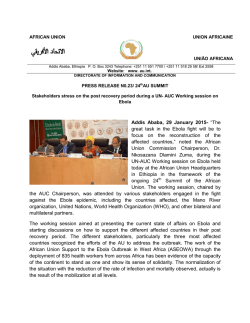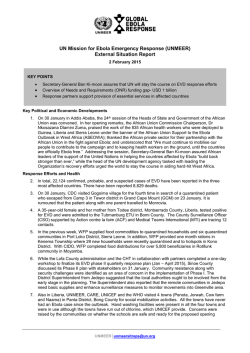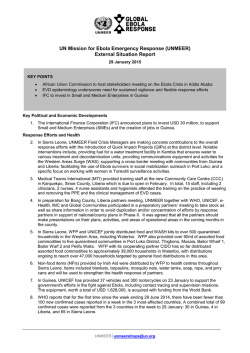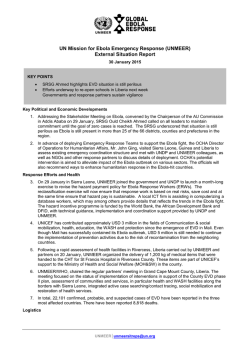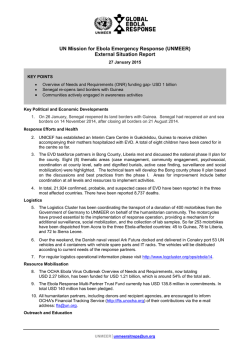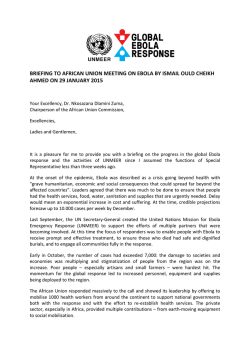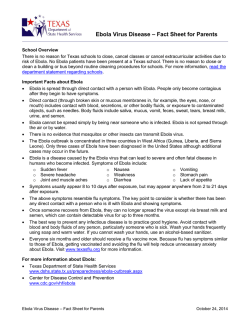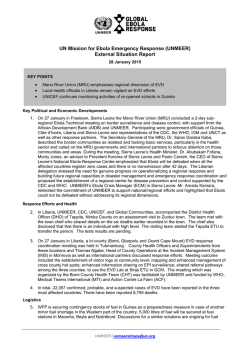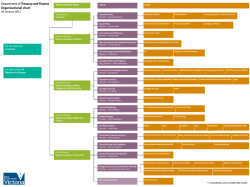
Africa Update
ML Strategies Update David Leiter, [email protected] Georgette Spanjich, [email protected] Katherine Fox, [email protected] Sarah Mamula, [email protected] ML Strategies, LLC 701 Pennsylvania Avenue, N.W. Washington, DC 20004 USA 202 296 3622 202 434 7400 fax www.mlstrategies.com FOLLOW US ON TWITTER: @MLStrategies JANUARY 29, 2015 Africa Update Leading the News West Africa Ebola Outbreak st th On January 21 , the U.S. Agency for International Development (USAID) published its 17 fact sheet on the Ebola outbreak in West Africa. The most recent fact sheet highlights that Mali has officially been declared Ebola-free following two 21-day cycles without any new confirmed cases in the country. In addition, the fact sheet noted the opening of a new Ebola treatment unit (ETU) in Liberia’s Lofa County, as well as the reopening of schools in Guinea. The fact sheet can be accessed here. nd On January 22 , the United Nations (U.N.) commended Mali for stemming its Ebola outbreak and urged all West African countries that have experienced Ebola cases to remain vigilant. In addition to acknowledging the end of the Ebola outbreak in Mali, the U.N. Mission for Ebola Emergency Response (UNMEER) and the World Health Organization (WHO) announced preparations for a cross-border meeting to be held this week in Liberia to discuss strategies for improving border surveillance and strengthening cross-border notification. Feedback from the U.N. was shared here. nd On January 22 , Popular Science speculated on why the U.S. Centers for Disease Control and Prevention (CDC) worst case scenario projection of 1.4 million Ebola cases in West Africa by midJanuary 2015 never materialized. The CDC study, initially published in September, only included data up until the end of August, when the epidemic was growing quickly and few aid organizations had yet to step in to help. While it is difficult for epidemiologists to project scales of assistance, it is also likely the WHO overestimated unreported cases. Additional analysis of the CDC forecast was provided here. nd On January 22 , The New York Times reported that manufacturing challenges make it unlikely that experimental Ebola drug ZMapp will be used to treat large numbers of Ebola patients in West Africa as the current outbreak appears to be ebbing. The first clinical trial to test the effectiveness of ZMapp is due to begin in Liberia in three weeks, but that trial is likely to only include 150 patients. According to federal officials, researchers, and biotechnology executives, efforts to produce more of the drug ran into snags and facilities that were built by the U.S. Department of Health and Human Services (HHS) to rapidly manufacturing drugs for public health emergencies are not yet producing ZMapp. Details can be viewed here. rd On January 23 , the WHO announced a special meeting on Ebola, as a senior official warned against the false sense of security generated by declines in new cases. U.N. officials admitted they are concerned about losing funding from U.N. Member States, as the greatest risk to reaching zero is the gap between needed and provided financial resources and medical professionals. The program of the WHO meeting on Ebola was outlined here. rd On January 23 , WHO Assistant-Director-General Dr. Bruce Aylward warned if funds and aid workers are not mobilized before the rainy season in West Africa begins in April, it may take up to another full year to stop the spread of Ebola in the region. The situation is especially dire, as the WHO is expected to run out of funding that has already been collected for the Ebola response in mid-February. Dr. Aylward noted that $260 million of the $350 million Ebola budget for the next six months has yet to be donated. Dr. Aylward’s remarks were recorded here. rd On January 23 , Liberian Deputy Health Minister Tolbert Nyenswah reported that Liberia had only five confirmed cases of Ebola in the country as of Friday, including three cases in Monrovia, one in Bomi County, and one in Grand Cape Mount County. According to Deputy Minister Nyenswah, the evidence that Liberia is getting closer to reaching zero cases is a sign that the international Ebola response has been working. In addition, he speculated that Liberia could be Ebola-free by the end of next month. Deputy Minister Nyenswah’s comments were captured here. rd On January 23 , Nigerian President Goodluck Jonathan authored an article for USA Today arguing that Nigeria can offer a model for other countries dealing with Ebola on how to promote coordination, better controls, and technology. According to President Jonathan, it was Nigeria’s implementation of a coordinated emergency management strategy to treat those infected quickly, identify and monitor those in contact with the disease, and educate citizens about the risks and effects of Ebola that led to Ebola’s eradication in Nigeria in just a few weeks. The article can be read here. rd On January 23 , the U.S. National Institutes of Health (NIH), GlaxoSmithKline (GSK), and Merck & Co. launched a new effort to test an experimental Ebola vaccine on thousands of Liberians with the arrival of the first doses of the vaccine candidate. The plan is to enlist as many as 27,000 people for the study at a rate increasing to as many as 3,000 a week in the areas around Monrovia. The evidence produced from the trial in Liberia could ultimately help the vaccine achieve U.S. Food and Drug Administration (FDA) approval. Plans for the trial were outlined here. rd On January 23 , NIH National Institute of Allergy and Infectious Diseases (NIAID) Director Dr. Anthony Fauci said that two Ebola vaccines, one developed by NIH, GSK, and Merck & Co. and one developed by NewLink Genetics Corp., may go through an alternative pathway for U.S. regulatory approval because the waning epidemic is making it difficult to collect the full data needed from clinical trials to demonstrate efficacy of the vaccines in humans. As a result, the vaccines may file for regulatory approval using human safety and immune response results from trials in Liberia with efficacy data from earlier animal studies. More information can be seen here. rd On January 23 , U.S. Department of Defense (DOD) Press Secretary Rear Admiral John Kirby said the Pentagon has decided not to deploy about 350 National Guard troops from Minnesota, Ohio, Texas, and Iowa, who were scheduled to join the mission to combat Ebola in Liberia. Rear Admiral Kirby said the troops were no longer needed in Liberia, where Ebola transmission has slowed. About 2,300 U.S. troops remain in Liberia. The cancelation of the National Guard deployments was noted here. rd On January 23 , U.S. Senators Ted Cruz (R-TX), John Cornyn (R-TX), and Chuck Grassley (R-IA) introduced the Operation United Assistance Tax Exclusion Act. The bill would provide that members of the U.S. military deployed to perform hazardous humanitarian services in West Africa to combat the spread of the Ebola outbreak be entitled to the same tax benefits as those serving in a combat zone. The benefit would only be applied to service members required to undergo a 21-day quarantine upon their return from West Africa. A copy of the bill can be downloaded here. th On January 25 , as the battle against Ebola in West Africa continued among positive indicators that transmission of the virus is slowing, the WHO’s executive board unanimously adopted a resolution aimed at overhauling its capacity to head off and respond to infectious disease outbreaks and other public health emergencies. The resolution includes the creation of a global cadre of emergency public health workers, the establishment of a fund that could be tapped quickly, and stepped-up support for the development of vaccines, diagnostics, and treatments for emerging infectious diseases. Key provisions in the resolution were highlighted here. th On January 26 , the Senegalese Ministry of Interior announced the reopening of the land border with Guinea, which had been closed in August to prevent the spread of Ebola. The decision to reopen the land border follows Senegal’s November decision to lift another ban on air and maritime traffic with th Guinea, Liberia, and Sierra Leone. As of January 18 , the WHO reported that Guinea had only reported 20 new cases of Ebola in the most recent week, compared to 45 new cases reported the week before. The reopening of the border was announced here. th On January 26 , during a visit to Liberia, Oxfam Chief Executive Mark Goldring said a multi-million dollar plan is needed to help the economies of Liberia, Guinea, and Sierra Leone recover and to avert a double disaster following the Ebola crisis. According to Goldring, the plan should include cash for families affected by the Ebola epidemic, investment in jobs, and support for basic services. This vision is based on research conducted by Oxfam in three Liberian counties that found that three in four families had seen their incomes decline, with an average income drop of approximately 39 percent. Oxfam’s research on the economic impacts of the Ebola outbreak was summarized here. th On January 27 , the New York Times profiled Dr. Matshidiso Moeti, the WHO’s new Regional Director for Africa, to coincide with her appointment on Tuesday. Originally from South Africa, but raised in Botswana, Dr. Moeti acknowledged her new role will put her at the forefront of the international effort to stop the spread of Ebola. Her background is in tuberculosis and HIV programs and she has previously worked for three U.N. agencies. The full article was published here. th On January 27 , World Bank Group President Jim Yong Kim delivered a lecture at Georgetown University on “Lessons From Ebola: Toward a Post-2015 Strategy for Pandemic Response.” President Kim’s lecture is the first as part of Georgetown’s new Global Futures Initiative, which was designed to address critical issues by encouraging innovative teaching and research agendas. Event details were posted here. th On January 28 , USAID’s Office of U.S. Foreign Disaster Assistance provided insights on the challenges USAID has encountered in transporting vital supplies and critical commodities to West Africa as part of the Ebola response. The large scale of the outbreak, the lack of infrastructure in West Africa, and the large demand for supplies, including personal protective equipment (PPE), have been obstacles encountered as part of the response. More information was shared here. th On January 28 , The New England Journal of Medicine published the findings of a British clinical trial for the Ebola vaccine developed by NIH and GSK. The Oxford University 60-patient trial found that the vaccine triggered an immune response to the virus, although at a lower level than what U.S.-based researchers saw in a parallel study on a smaller group of volunteers at NIH. The outcomes of the British clinical trial were summarized here. th On January 29 , Safaribookings.com, a marketplace for over 1,200 safari companies in east and southern Africa, reported that inquiries have increased over the last three weeks, as a result of the end of the Ebola crisis. Tourism is slowly recovering across the rest of the continent as the epidemic winds down and global fear lessens. Details on the recovery of the tourism industry in Africa can be seen here. Libya nd On January 22 , the U.N. Support Mission in Libya (UNSMIL) condemned the reported armed attack against the country’s Central Bank branch in Benghazi and called for an independent investigation. UNSMIL said it viewed the incident as a breach of the ceasefire agreement that was unilaterally reached last week and called for adherence to the truce in order to create a conducive environment for the peace talks between factions in Libya. UNSMIL’s reaction to the attack can be seen here. th On January 24 , the top U.N. official in Libya, Special Representative Bernardino Leon, condemned a fatal shooting incident outside a U.N. facility in the capital. The attack is the latest outburst of violence breaching the ceasefire agreement, which was announced following U.N.-facilitated talks among parties to the Libyan conflict. More information is available here. th On January 24 , Libyan militant group Ansar Al-Sharia posted a statement on Twitter confirming the death of its leader Mohammed al-Zahawi. While it had been rumored that Zahawi was killed in attack late last year, the statement released by Ansar Al-Sharia gave no details about how or when Zahawi was killed. The U.S. Government has blamed Ansar Al-Sharia for the September 2012 attack on the U.S. diplomatic mission in Benghazi that killed U.S. Ambassador to Libya Chris Stevens and three other Americans. Zahawi’s death was confirmed here. th On January 25 , UNSMIL announced that Libyan stakeholders would return to Geneva, Switzerland, this week for a second round of dialogue, following the first round of talks last week. These discussions will build on stakeholders’ agreement on a commitment to a united and democratic Libya governed by rule of law and respect for human rights. More on the ongoing peace talks can be found here. th On January 26 , stakeholders in the Libyan conflict gathered in Geneva to begin a new round of U.N.facilitated talks aimed at resolving the country’s political crisis. Discussions stemmed from last week’s agreement on an agenda calling for the formation of a national unity government, the cessation of fighting, and the withdrawal of armed groups from Libyan cities. More on the humanitarian effects of violence in Libya can be seen here. th On January 27 , five, masked gunmen stormed the luxury Corinthia Hotel in Tripoli, Libya, killing at least five foreigners and three guards. Initial reports indicated the gunmen, who were thought to have escaped the scene, may have also taken hostages. Following the onset of the attack, two commercial landmark towers behind the hotel were evacuated due to security concerns. The hotel, which had been relatively empty at the time of the incident, previously came under attack in 2013. Information on the attack can be viewed here. th On January 27 , the U.N. Security Council condemned the recent terrorist attacks in Tripoli, Libya. In a statement, Security Council members expressed their condolences to the victims’ families and the need to bring the perpetrators, financiers, and sponsors of the attack against the Corinthia Hotel to justice. For more details, click here. th On January 28 , the Libyan Ministry of Interior provided an update on the attack on the Corinthia Hotel in Tripoli, Libya. According to officials, at least ten people and two attackers were killed, including five Libyans, one American, one French citizen, and three people from Tajikistan. While the Libyan branch of the Islamic State of Iraq and the Levant (ISIL) claimed responsibility for the attack and identified the gunmen as Tunisian Abu Ibraheem Al-Tunsi and Sudanese citizen Abu Sulaiman Al-Sudani, the Libyan Government expressed its belief that the attackers were Libyans. Meanwhile, U.S. security contractor Crucible identified its employee David Berry as the American killed in the attack. An update was provided here. th On January 28 , the Governments of the U.S., France, Germany, Italy, Malta, and the United Kingdom (U.K.) issued a joint statement condemning the attack on the Corinthia Hotel in Tripoli, Libya. The global leaders rejected this act of terrorism and said it should not be allowed to undermine Libya’s political process. In addition, the governments expressed ongoing support for the U.N.-brokered talks between Libyan parties to find a political solution to the ongoing political, security, and institutional crisis in the country and called on all sides to refrain from actions that would undermine the prospects for a successful political dialogue, including any effort to divert necessary supplies of food, electricity, and water from major population centers. The full joint statement can be read here. Nigeria rd January 23 , the U.N. World Food Program (WFP) announced it needs roughly $11 million to continue food distribution to refugees displaced by violence in northeastern Nigeria. The number of refugees is now above 13,000, as Nigerians flee their homes following Boko Haram’s continued campaign of violence. More on refugee needs can be read here. rd On January 23 , The New York Times reported that the recent escalation of Boko Haram violence in Nigeria may boost former military leader Muhammadu Buhari’s candidacy in the presidential election scheduled for next month. Speaking at a recent campaign rally in Kano, Buhari said the Boko Haram threat would be the first problem he would seek to solve if elected. This is a priority for many of Buhari’s supporters who feel that incumbent President Goodluck Jonathan has not done enough to fight the violent extremists. Prospects for Buhari’s victory were addressed here. th On January 25 , Boko Haram attacked Maiduguri, Nigeria, where fighters were pushed back by the Nigerian military. According to military officials, about 200 Boko Haram fighters were killed in the clashes. According to reports, Boko Haram attacked Borno state’s capital early Sunday morning, with fighting continuing into the night. As they fled Maiduguri, Boko Haram militants also took over the town of Monguno, where they gained control of a military base and ammunition store, and attacked several villages in Adamawa state. In response, Nigerian defense officials announced a 24-hour curfew in Maiduguri. For details, click here. th On January 26 , additional details emerged on Boko Haram’s assault on Monguno, Nigeria. While Nigeria soldiers were initially able to repel the Boko Haram fighters, the group mobilized more fighters, eventually overwhelming the military and forcing Nigerian troops to retreat. Because Monguno, which is home to about 100,000 people, is viewed to have strategic military significance, concerns arose that Boko Haram would launch another effort to take Maiduguri. More information can be found here. th On January 26 , the Nigerian military launched air strikes as part of an effort to recapture Monguno from Boko Haram insurgents. A spokesman for the military said that air strikes began following ground troops being forced to retreat. In addition, defense officials indicated that fighting on Monday had killed at least 15 Nigerian soldiers and more than 25 civilians. An update was provided here. th On January 25 , U.S. Secretary of State John Kerry traveled to Lagos, Nigeria, to emphasize the importance of ensuring the upcoming elections are peaceful, non-violent, and credible. While in Nigeria, Secretary Kerry met with presidential candidates President Goodluck Jonathan and Major General Muhammadu Buhari, where he indicated the U.S. will deny visas to anyone engaged in pre-election violence. He also met with staff and families of the Consulate General in Lagos. Secretary Kerry was accompanied by Assistant Secretary of State for African Affairs Linda Thomas-Greenfield, Special Representative for Commercial and Business Affairs Scott Nathan, Deputy Chief of Staff Jon Finer, Deputy Spokesperson Marie Harf, and Vice Admiral Kurt Tidd. Secretary Kerry’s visit to Nigeria was announced here. Secretary Kerry’s remarks during press availability in Lago were transcribed here. th On January 27 , Nigeria’s main opposition All Progressives Congress (APC) party said its presidential candidate, Muhammadu Buhari, will not accept any postponement of the presidential election scheduled th for February 14 . In addition, APC National Public Secretary Lai Mohamed accused the Nigerian Government of politicizing the Boko Haram insurgency to keep the ruling party in power. The APC statement came in response to reports that the ruling People’s Democratic Party (PDP) of President Goodluck Jonathan had been canvassing media houses trying to influence a delay of the polls. More information can be viewed here. th On January 28 , the head of the electoral commission in Nigeria announced that the presidential th elections scheduled for February 14 would not be delayed. The statement comes after President Goodluck Jonathan's National Security Advisor Sambo Dasuki asked that elections be postponed so that the distribution of permanent voter cards could continue. Additional information on the Nigerian presidential election can be read here. th On January 29 , U.S. officials expressed concern with Boko Haram’s growing online presence over the past several days and the launch of an online media channel, The Indissolube Link, which seems to mirror ISIL’s web campaign. The similarities between both groups’ online forums have heightened concerns that the two groups may be moving towards collaboration through some kind of alliance. Growing fears of coordination between Boko Haram and ISIL were articulated here. Democratic Republic of Congo nd On January 22 , U.N. Under-Secretary-General for Peacekeeping Operations Herve Ladsous briefed the U.N. Security Council on developments in the Democratic Republic of Congo (DRC), where clashes between demonstrators and security forces related to the presidential election planned for 2016 entered into a third day. The briefing came as U.N. Secretary-General Ban Ki-moon issued a statement expressing concern about the unrest in Kinshasa following the adoption of a draft electoral law by the National Assembly that would require a census before the presidential election. In addition to calling for restraint, Secretary-General Ban reiterated the need for a credible, peaceful, and timely electoral process, in accordance with the DRC’s Constitution. The U.N. response to the situation in the DRC was detailed here. rd On January 23 , as protests in Kinshasa entered into a fourth day, the DRC Senate scrapped plans for a national census before the 2016 presidential election. The opposition said a similar draft law already approved by the National Assembly would have kept DRC President Joseph Kabila, who is term-limited under the Constitution, in power for years. Senate President Leon Kenga Wa Dondo noted the Senate had modified their bill to say that any revision of the electoral law must respect the constitutional deadline for elections. Following the Senate vote, a parliamentary committee met to try to reconcile the differences between the two proposals and move a compromise bill towards a vote before the end of the parliamentary session. The Senate action was noted here. rd On January 23 , the Office of the U.N. High Commissioner for Human Rights (OHCHR) expressed alarm at the apparent excessive use of force by security officers against demonstrators in the DRC. More than 13 people have reportedly been killed, and more than 30 injured, during anti-Government th demonstrations in Kinshasa and Goma. The protests began on January 19 , following the passage of an electoral bill through the lower house of the legislature. More information on the protests and U.N. efforts in the DRC can be found here. th On January 25 , the U.S. Department of State released a statement welcoming the Parliament of the DRC’s approval of electoral legislation that sets the country on course towards timely elections in line with its constitution. The State Department applauded the efforts of the National Assembly and the Senate to reach consensus and ensure that presidential elections happen no later than December 2016. Further, U.S. officials urged DRC President Joseph Kabila to expeditiously sign the legislation and act to foster the country’s first peaceful transition of power through peaceful, transparent, and inclusive elections. The statement was published here. th On January 29 , the DRC’s army declared the official start of efforts against Rwandan Hutu rebels. General Leon Kasonga, an army spokesman, said while the campaign has started, combat had yet to nd begin. Conflict is imminent as the rebels missed the January 2 deadline set by regional leaders to disarm. For details on the conflict in the DRC, click here. South Sudan rd On January 23 , U.N. Secretary-General Ban Ki-moon welcomed the signing of a peace deal between opposition factions in South Sudan and called for the accord’s immediate implementation. The accord addresses a December 2013 conflict that has since uprooted an estimated 1.9 million people. It follows an initial ceasefire signed in January 2014 that failed to stem the conflict. Excerpts from SecretaryGeneral Ban’s statement can be read here. rd On January 23 , the Governments of the U.S., the U.K., and Norway expressed a joint statement expressing concern with the continued lack of progress in the South Sudan peace negotiations. While commending the commitment of the Intergovernmental Authority on Development (IGAD) to the peace process, the Troika expressed disappointment in the unwillingness of both the Government of South Sudan and the Sudan’s People’s Liberation Movement – In Opposition (SPLM-IO) to make compromises in order to achieve a viable peace agreement. Further, the global powers noted the grave humanitarian crisis in South Sudan. The full statement can be read here. th On January 27 , the U.N. Children’s Fund (UNICEF) celebrated the release of approximately 3,000 South Sudanese child soldiers by the South Sudan Democratic Army (SSDA) Cobra Faction. The U.N. reports that some of the children, ranging from ages 11 to 17, have been fighting for nearly four years and may never have been to school. UNICEF is currently working to trace and reunite the children with their families. More information on the child soldiers released in South Sudan can be found here. th On January 27 , the killing of 11 civilians, including five journalists, was publically condemned by the U.N. Mission in South Sudan (UNMISS). The deaths occurred as a result of a roadside ambush by unidentified gunmen on Sunday. Details on the incident can be seen here. th On January 29 , after appearing at the African Union (AU) Summit held in Addis Ababa, Ethiopia, BBC News reported that South Sudanese President Salva Kiir had fallen ill and postponed a continuation of peace talks with former Vice President Riek Machar until Saturday. The two leaders had met on Wednesday in Ethiopia under the auspices of the IGAD. Reportedly, President Kiir was treated for nose bleeds later on Wednesday, but his aides denied reports that he had been taken to the hospital. President Kiir and former Vice President Machar have allegedly agreed to form a unity government, but remain deadlocked over the powers of the new prime minister. The situation was reported here. Central African Republic nd On January 22 , the U.N. Security Council unanimously adopted a resolution renewing a series of sanctions targeting all individuals involved in undermining the peace, stability, and security of the Central African Republic (CAR) and calling on all Member States to maintain sanctions, including an arms embargo, travel ban, and asset freeze, through January 2016. The Security Council expressed grave concern at the continuing destabilization of the CAR by Muslim Seleka rebels and Christian anti-Balaka militias and warned the situation poses a threat to peace and security in the region. For details, click here. rd On January 23 , the U.N. refugee agency (UNHCR) launched an appeal for funding to support aid efforts for over 450,000 refugees from the CAR. The $331 million request seeks to provide basic services for refugees fleeing violence associated with over two years of civil war and sectarian strife. UNHCR’s efforts to date in CAR were explained here. th On January 27 , U.N. Senior Humanitarian Coordinator in the CAR Claire Bourgeois called for additional protection for internally displaced persons (IDPs) in the northern town of Batangafo. After a recent visit to the site, Coordinator Bourgeois assessed that enhanced security must be provided for the hundreds of people arriving to Batangafo each day. According to U.N. reports, there are more than 30,000 IDPs at the main camp. Details can be viewed here. th On January 27 , the U.S. Department of State welcomed the launch of grassroots consultations in the CAR. As part of the consultations, a team will travel throughout the country and to neighboring nations where citizens of the CAR have sought refuge to seek input to help move the nation away from violence and conflict and forward toward unity, prosperity, and peace. In addition to expressing support for the President of the Transitional Government Catherine Samba Panza and the efforts of CAR Mediator Republic of Congo President Denis Sassou N’Guesso, as well as U.N. and AU mediators, the State Department articulated its vision for a political transition process in the CAR that includes a national dialogue in Bangui, a constitutional referendum, and free and fair legislative and presidential elections later this year. A statement was released here. th On January 29 , the Government of the CAR rejected the ceasefire deal negotiated in Kenya between the country’s two rival groups, the Seleka alliance and the anti-Balaka militia. The rejection of the agreement was announced here. Zambia rd On January 23 , the Zambian electoral commission noted that it had counted approximately 80 percent of the votes cast in last week’s presidential election. Results from 121 of 150 constituencies showed ruling party Patriotic Front (PF) candidate Edgar Lungu in the lead with 48.72 percent of the vote, followed by opposition United Party for National Development (UPND) candidate Hakainde Hichilema slightly behind with 46.85 percent of the vote. Progress on the vote counting was noted here. th On January 24 , U.S. President Barack Obama announced the designation of a Presidential Delegation to Lusaka, Zambia, to attend the inauguration of Edgar Lungu. The delegation was led by Under Secretary of State for Civilian Security, Democracy, and Human Rights Sarah Sewall and also included U.S. Ambassador to Zambia Eric Schultz and Ambassador-At-Large, Global AIDS Coordinator, and Special Representative for Global Health Diplomacy Deborah Birx. The Presidential Delegation was announced here. th On January 25 , U.N. Secretary-General Ban Ki-moon congratulated the Zambian Government and people on the peaceful execution of their recent presidential election. The election, held following the death of President Michael Sata in October 2014, was won by Edgar Lungu, the country’s Defense and Justice Minister. More can be read here. th On January 25 , the U.S. Department of State issued a statement congratulating the people of Zambia, the Electoral Commission of Zambia, and domestic, regional, and international monitoring groups for conducting another democratic election. The State Department encouraged that any issues should be resolved in the same spirit and democratic tradition. Additionally, the State Department congratulated Edgar Lungu on his victory and pledged to continue close coordination on health care, promoting peace and security in the region, attracting investment, and spurring economic development. The statement was issued here. United States – Africa Relations White House rd On January 23 , the Human Rights Campaign (HRC) joined 13 other human rights groups in urging the Obama Administration to take additional action against Gambian leaders following the regime’s ongoing crackdown and persecution of lesbian, gay, bisexual, transgender (LGBT) citizens. In a letter to President Barack Obama, the human rights groups suggested banning Gambian President Yahya Jammeh and his associates from entering the U.S. and freezing his assets. In addition, the coalition called on the U.S. Government to ask The Gambia to account for the individuals it is holding, and to either charge or release them. The letter can be downloaded here. State Department rd On January 23 , Secretary of State John Kerry delivered remarks at the World Economic Forum (WEF) in Davos, Switzerland. In his speech, Secretary Kerry addressed threats around the globe, including those posed by Boko Haram in Nigeria and Al Shabaab in Somalia. Secretary Kerry said there are no grounds of history, religion, ideology, grievance, psychology, politics, economic disadvantage, or personal ambition that will ever justify the kidnapping and the rape of teenage girls or the slaughter of unarmed civilians and called for greater collaboration to combat violent extremism. Secretary Kerry’s speech was transcribed here. rd On January 23 , Assistant Secretary of State for African Affairs Linda Thomas-Greenfield met with the AU African Growth and Opportunity Act (AGOA) Delegation at the Department of State. The meeting was listed here. th th On January 27 , State Department condemned the January 20 aerial bombing of the Doctors Without Borders (MSF) hospital in Frandala, Southern Kordofan by the Sudan Armed Forces. The State Department also expressed its belief that such attacks against civilian and humanitarian workers in conflict zones demonstrate the government’s disregard for the wellbeing of its people and international obligations. State Department officials repeated their call upon the Government of Sudan to halt its campaign of armed violence that is undermining the humanitarian response. A press statement can be accessed here. th On January 27 , the State Department welcomed the reported release of six journalists on bail in Eritrea. However, the State Department expressed concern that the government continues to detain other journalists, reportedly as many as 17. State Department officials encouraged the Government of Eritrea to take immediate steps to release these detainees, all persons detained on the basis of their religious beliefs, members of the G-15, and all other political prisoners. A statement was published here. th st On January 27 -31 , Assistant Secretary of State for African Affairs Linda Thomas-Greenfield led the th interagency U.S. observer delegation to the AU’s 24 Ordinary Sessions of the Assembly of the Union and its related events, held in Addis Ababa, Ethiopia. In addition to the Summit events, Assistant Secretary Thomas-Greenfield held bilateral meetings with senior Ethiopian leaders, AU member states, and the AU Commission to discuss the range of issues and challenges in Africa today. More information can be seen here. th On January 28 , Under Secretary of State for Economic Growth, Energy, and the Environment Catherine Novelli met with U.S. Ambassador to South Africa Patrick Gaspard, at the Department of State. The meeting was listed here. th On January 28 , Deputy Assistant Secretary of State for Democracy, Human Rights, and Labor Karen Hanrahan delivered remarks commemorating the third anniversary of the National Action Plan on Women, Peace, and Security. Deputy Assistant Secretary Hanrahan noted elements of the National Action Plan have been implemented in South Sudan, Egypt, and the DRC to help bring more women to negotiation tables, to integrate solutions and justice for women into peace agreements, and to ensure humanitarian responses protect women. Her prepared remarks were posted here. th On January 28 , the State Department expressed concern for reports of arrests and indefinite detentions of Equatoguinean citizens protesting the expenditures incurred by the Government of Equatorial Guinea to host the ongoing Cup of African Nations (CAN) football tournament. The State Department also expressed concern for reports that one detainee may have been assaulted by police while in custody and that all those detained have not been allowed access to legal counsel. U.S. officials called upon the Government of Equatorial Guinea to ensure the humane treatment of individuals arrested and to ensure their rights to be informed of the charges against them and to a fair trial. A statement was released here. U.S. Agency for International Development th On January 27 , USAID announced it will commit $1 billion over FY15-FY18 to Gavi, The Vaccine Alliance, subject to congressional approval. The U.S. contribution will support Gavi’s plan to immunize 300 million additional children and save at least five million lives by 2020. This initiative will build upon the Child Survival Call to Action: A Promise Renewed, which launched in Jun 2012 and has helped to reduce child mortality rates in 24 priority countries, including 16 in Africa. A press release was issued here. th On January 28 , USAID Administrator Rajiv Shah attended the Powering Africa Summit in Washington, DC. The Summit brought together Africa Ministries, utility companies, and all investment agencies from the U.S. working across Africa to meet with the international power community to discuss the progress of initiatives, such as USAID-led Power Africa. U.S. Secretary of Energy Ernest Moniz and Overseas Private Investment Corporation (OPIC) President and CEO Elizabeth Littlefield also participated in the Summit. Event details were posted here. Department of Defense rd On January 23 , service members in Liberia deployed as part of Joint Forces Command – United Assistance (JFC-UA) visited the Liberian National Museum near the center of Liberia as part of a crosscultural exchange trip. As part of the trip, as many as 50 U.S. soldiers visited the museum where they met with the museum’s educational officer ant toured the museum’s monuments, artifacts, and artwork. An article on the visit can be read here. th On January 26 , Combined Joint Task Force – Horn of Africa (CJTF-HOA) shared insights from the East Africa Theater Security Cooperation (EATSC) Conference, recently held at Camp Lemonnier, Djibouti. The conference hosted many distinguished visitors and ambassadors to East African nations, including Ambassador Phillip Carter of U.S. Africa Command (AFRICOM). The conference provided a forum for open dialogue and increased mutual understanding of operations, militaries, and needs among members of East African nations. The conference was described here. th On January 27 , Defense News provided an update on preparations for Flintock 2015, which will kick off th on February 16 in N’Djamena, Chad, with joint training exercises also scheduled in Niger, Nigeria, Cameroon, and Tunisia. The exercise will bring together approximately 1,300 troops from African and NATO countries, including 673 African forces, 365 NATO forces, and 255 U.S. personnel who will take part in a variety of tactical engagements to improve interoperability and communication and humanitarian response capabilities. Planning for Flintock 2015 was detailed here. th On January 27 , the Center for Strategic and International Studies (CSIS) hosted a military strategy forum with AFRICOM Commander General David Rodriguez titled, “AFRICOM: Strategic Opportunities and Challenges.” The discussion was moderated by Dr. Kathleen Hicks of CSIS. In his remarks, Commander Rodriguez expressed his belief that a full-scale, four-country, counterinsurgency plan is needed to defeat Boko Haram, but additional authorities will need to be granted by the Nigerian Government. The discussion was summarized here. th On January 28 , the AFRICOM-sponsored international maritime exercise Cutlass Express 2015 kicked off in Djibouti. The exercise is designed to improve regional cooperation, maritime domain awareness (MDA), and information-sharing practices to increase the capabilities of East African and Indian Ocean nations to counter sea-based illicit activity. Participating nations include Australia, Canada, Comoros, Djibouti, Madagascar, Mauritius, Mozambique, Kenya, Uganda, South Africa, Seychelles, Tanzania, and Turkey. Quick facts on the exercise can be accessed here. U.S. Trade and Development Agency th On January 26 , the U.S. Trade and Development Agency (USTDA) announced the appointment of Enoch Ebong as the Agency’s new Deputy Director. In this role, Deputy Director Ebong will help lead USTDA’s efforts to link U.S. businesses to global infrastructure opportunities. Deputy Director Ebong has previously served as USTDA’s Acting Regional Director for sub-Saharan Africa, Deputy General Counsel, and General Counsel. Her appointment was announced here. Congress th On January 27 , Senators Chris Coons (D-DE) and Johnny Isakson (R-GA) sent a letter to U.S. Trade Representative (USTR) Michael Froman expressing their support for the reauthorization of the African Growth and Opportunity Act (AGOA), while also suggesting that AGOA is in need of careful review and modification to address numerous challenges and concerns. In particular, Senators Coons and Isakson indicated their intent to address South African antidumping duties levied on U.S. poultry as part of the reauthorization. The letter can be downloaded here. th On January 27 , the House Foreign Affairs Africa Subcommittee held a hearing titled, “Nigeria on the Brink?” Witnesses included Principal Deputy Assistant Secretary of State for African Affairs Robert Jackson, J. Peter Pham of the Atlantic Council, Jadegoke Adebonajo Badejo of Bonajo Badejo & Co., Emmanuel Ogebe of Jubilee Campaign USA, and Chris Fomunyoh of National Democratic Institute. A recording of the hearing can be watched here. th On January 27 , the House Select Committee on Benghazi held its third hearing to review outstanding requests related to its investigation of the September 2012 attacks against U.S. facilities in Benghazi, Libya. Testimony was provided by Central Intelligence Agency (CIA) Director of Congressional Affairs Neil Higgins and Deputy Assistant Secretary of State for Legislative Affairs Joel Rubin. A webcast of the hearing can be viewed here. th On January 27 , to coincide with the House Select Committee on Benghazi’s third hearing, the Associated Press reported on tensions between the Republican and Democratic members of the Committee. According to Chairman Trey Gowdy (R-SC), the Committee needs greater cooperation from the State Department and other agencies to conduct its investigation. Meanwhile, Ranking Member Elijah Cummings (D-MD) has accused Chairman Gowdy of excluding Democrats from the process, including by using different standards for Republicans and Democrats and holding secret meetings with witnesses from the State Department and other agencies. The full story is available here. th On January 27 , following the third public hearing of the House Select Committee on Benghazi, Ranking Member Elijah Cummings (D-MD) said he has spoken to former Secretary of State Hillary Clinton about the possibility of testifying before the Committee at the request of Chairman Trey Gowdy (R-SC) and she did not hesitate for one second. Congressman Cummings said that Secretary Clinton indicated last year that she wanted to testify in December, but could also do so in January. More information can be seen here. th On January 28 , House Foreign Affairs Africa Subcommittee Ranking Member Karen Bass (D-CA) hosted an Africa Policy Breakfast on “AGOA Today and Beyond: The Future of the U.S.-Africa th Commercial Relationship.” AGOA is due to expire on September 30 . Participants included senior representatives from leading U.S. agencies, international NGOs, and the African diaspora. Additional information was posted here. North Africa rd On January 23 , Tunisian Prime Minister-designate Habib Essid proposed a government without any cabinet posts for moderate Islamists after negotiations between the secular Nidaa Tounes party and other smaller partners in parliament. Notable cabinet members include Defense Minister Farhat Hacheni, Finance Minister Lassaad Zarrouk, and Foreign Minister Taieb Baccouche. The Ennahda Islamist party, which holds the second largest number of seats in the assembly behind Nidaa Tounes, had sought to achieve a unity government. The full story is available here. rd On January 23 , 17-year-old Egyptian student Sondos Rida Abu Bakr was killed during clashes between Muslim Brotherhood protestors and security forces in Alexandria. A security official in Alexandria said several people were wounded, but denied that security forces had opened fire to disperse the demonstrators. The incident was reported here. th On January 26 , it appeared the Tunisian parliament would reject Prime Minister-designate Habib Essid’s proposed cabinet ministers when the Afek Tounes party aligned with the Ennahda and Popular Front parties in opposition. The rejection by parliament would be a significant blow to the ruling Nidaa Tounes party and would require President Caid Essebsi to appoint a new prime minister to form a cabinet. The full story is available here. th On January 26 , Alaa and Gamal Mubarak, the sons of ousted Egyptian President Hosni Mubarak, were released from prison after court ordered their release last week pending their retrial in a corruption case. According to security officials, upon their release, the Mubaraks visited their father in a military hospital before being escorted to their home in Cairo. Their release follows the Sunday anniversary of President Mubarak’s 2011 fall from power, which saw 25 people killed during anti-government demonstrations. For more information, click here. th On January 26 , APR Energy said it would move its power-producing assets from Libya to other places in response to the Libyan Government’s failure to ratify its contract. The company shut off its power generation equipment two months ago when contract negotiations first hit a snag. Analysts suggest it could take as long as three months for APR to relocate all of its power assets currently in Libya, which have recently accounted for roughly a quarter of the company’s total sales. The situation was described here. th On January 27 , U.N. High Commissioner for Human Rights Zeid Ra'ad Al Hussein expressed deep concern for the recent clashes between security forces and protesters in Egypt. Over the weekend, at least 20 people were killed in and around Cairo. High Commissioner Al Hussein urged authorities to end the excessive use of force. The recent violence in Egypt was detailed here. th On January 27 , an Egyptian court upheld three-year jail sentences against three prominent liberal activists. In 2013, the three were charged with protesting without permission and assaulting the policy during violent protests around the anniversary of the 2011 uprising. More on the arrested activists is detailed here. th On January 27 , a car bomb in Alexandria killed one person and police discovered three other explosive devices. The violence coincides with the fourth anniversary of President Hosni Mubarak’s overthrow and activists’ current accusations that President Abdul Fattah Al-Sisi has returned Egypt to authoritarian rule. More on current conflict in Egypt can be found here. th On January 28 , press reports underscored the ripple effects of the political and social unrest in Egypt. Facing high rates of unemployment in the country, young Egyptians are seeking jobs in Libya. With Egypt now an unattractive place for foreign investors and tourists, unemployment has hit a rate of 13 percent. The situation was reported here. th On January 28 , the Bulgarian Foreign Ministry announced that a Sudanese rebel group took six Bulgarian aid workers hostage after their helicopter was forced to land in the South Kordofan province. Details related to the abduction can be read here. th On January 29 , the World Bank announced the significant decline in global oil prices will have a significant impact on Middle East and North African (MENA) economies. The World Bank’s latest brief on the region predicts that the trade balances of oil importers like Jordan, Tunisia, Lebanon, and Egypt, could improve by up to 2 percent of GDP. Conversely, oil exporting countries will likely incur larger deficits and a loss in surpluses. The MENA Quarterly Economic Brief can be accessed here. th On January 29 , MSF announced it would withdraw its Brussels branch from the war-torn parts of Sudan due to the lack of cooperation by authorities. The medical charity has been barred from accessing the Blue Nile State, making work in one of the hardest-hit regions impossible. The French section of MSF, however, will continue its operations in South and East Darfur. For information on MSF operations in Sudan, click here. th On January 29 , nearly 100 women assembled in Cairo to protest the deaths of activist Shaimaa Sabbagh and others allegedly killed by Egyptian security forces on the anniversary of Egypt’s 2011 uprising. Protesters demanded an investigation and chanted “The interior ministry are thugs!” at the site of Sabbagh’s death. The protest in Egypt was described here. East Africa nd On January 22 , following a meeting with Somali President Hassan Sheikh Mohamud and Prime Minister Omar Abdirashid Ali Sharmarke, representatives of the U.N., IGAD, the European Union (EU), the AU Mission in Somalia, the U.S., and the U.K. issued a joint statement regarding delays in addressing the political crisis in Somalia. The international leaders called on Somalia’s leadership and its political institutions to ensure the appointment of a Cabinet that receives the consent of the Federal Parliament without any further delay. The joint statement was published here. th On January 26 , the World Bank highlighted the findings of the recent Strategic Assessment of the Ethiopian Mineral Sector. While Ethiopian experienced an average economic growth rate more than double the annual average of countries in sub-Saharan Africa in 2014, the development of oil, gas, and mineral resources was not among the key drivers of Ethiopia’s growth. In order to ensure that Ethiopia’s resource wealth contributes to sustainable development, the World Bank suggested that Ethiopian authorities obtain good quality geo-data and put in place an effective data management system, pursue initiatives to further diversify the economy, and balance short-term and long-term development priorities. Excerpts from the assessment can be seen here. th On January 27 , Zakariya Ismail Hersi, the intelligence chief for Somalia’s Al Shabaab, announced he has quit the insurgency and denounced the violence perpetrated by the group. Speaking publically for the first time since his surrender to Somali authorities in December, Hersi called for reconciliation and understanding. Hersi is one of seven Al Shabaab leaders targeted by the Obama Administration. A $3 million bounty had been offered by the State Department for his capture. More information can be viewed here. th On January 27 , one person was killed and several injured during a clash between Kenyan police and Maasais protesting a local governor they accused of misappropriating tourism funds. The dispute is over revenue from entry fees for the Maasai Mara game reserve, one of the region’s largest tourist attractions. The conflict stems from Kenya’s 2013 implementation of devolution for local government funding, details of which were provided here. th On January 29 , the World Bank published its Tanzania Economic Update, indicating that bolstering the country’s already strong tourism industry could create more high-paying jobs and community connections. Currently, tourism in Tanzania employs nearly 500,000 people and contributes about 20 percent of country exports. A priority for President Jakaya Kikwete, by the year 2025, the Government hopes to multiply tourism revenues by eight. The World Bank report can be downloaded here. West Africa st On January 21 , the African Development Bank’s (AfDB) Climate Change Coordination Committee (CCCC) organized a knowledge sharing seminar in Abidjan, Cote d’Ivoire, to highlight the outcomes of th the 20 Conference of Parties (COP20) to the U.N. Framework Convention on Climate Change in Lima, Peru, in December. In addition to discussing how COP20 presented Africa with the opportunity to examine the implications of the proposed new and binding international agreement on the continent, the meeting also allowed the CCCC to begin planning for COP21, where a new universally binding climate agreement is expected to be approved in Paris, France, later this year. The seminar was summarized here. th On January 26 , Washington-based government relations firm Cassidy & Associates filed under the Foreign Agents Registration Act (FARA) to represent the Government of Nigeria. Cassidy & Associates has been tasked with developing a website to promote the Government’s Transformation Agenda. The website can be accessed here. th On January 27 , U.N. peacekeepers in northern Mali killed at least three people when they used live rounds to disperse protestors. The protestors were angered over a U.N. plan to create a buffer zone in the north, which is seen to favor Tuareg rebels over the pro-Bamako militia. The U.N. did not acknowledge the deaths, saying that only warning shots were fired. More on the violence and the proposed buffer zone is available here. th On January 27 , the Associated Press reported that American green energy company Buchanan Renewables, backed by $217 million in loans approved by OPIC, has left Liberia where it had been tasked with launching the world’s first biomass-driven economy. Following a number of questionable business decisions, and perhaps in light of lacking oversight, Buchanan dismissed 600 workers and left Liberia amid complaints of workplace injuries, environmental harm, and sexual abuse. The full story is available here. th On January 28 , a least nine people were killed in a suicide bomb attack in Mali. Sources from the Tuareg rebel group say the attack occurred in the town of Tabankort, a contested area where fighting has escalated over the last month. For details on the attack, click here. th On January 29 , Nigerian Development Minister Akinwumi Adesina announced the outbreak of H5N1 bird flu in the country’s poultry farms had spread to four additional states. At an emergency meeting in Abuja, Minister Adesina said a total of 11 states are now affected. According to reports, Kano state is experiencing the brunt of the outbreak, with 136,905 birds exposed and a 13 percent mortality rate. More details on the bird flu outbreak can be viewed here. th st On January 29 -31 , International Monetary Fund (IMF) Managing Director Christine Lagarde will visit Dakar, Senegal. While in Senegal, Director Lagarde is scheduled to meet with President Macky Sall and his team. In addition to meeting with representatives of the Senegalese business community and civil society, Managing Director Lagarde will also meet with senior officials of the Banque Centrale des Etats de l’Afrique de l’Ouest (BCEAO). Director Lagarde’s upcoming travel to Senegal was detailed here. Sub-Saharan Africa nd On January 22 , the World Bank Group’s Board of Executive Directors approved a $70 million International Development Association (IDA) credit to support the Government of Rwanda’s National Social Protection Strategy and to continue Rwanda’s effort to address chronic poverty and reduce the impacts of external shocks on poor people. The funding will be used to improve Rwanda’s social protection system by promoting accountability and transparency. For details, click here. rd On January 23 , WFP announced that roughly 77 metric tons of biscuits, enough to feed 77,000 people, was airlifted to Malawi following devastating flooding that has displaced more than 100,000 people. The latest figures indicate that some 370,000 people currently require urgent food and other assistance due to the flooding. Relief efforts were detailed here. rd On January 23 , Malawian Tobacco Control Commission Chief Executive Bruce Munthali warned that the recent lethal flooding in Malawi is likely to have caused extensive damage to tobacco fields. According to the World Bank, tobacco accounts for approximately 60 percent of Malawi’s exports. The assessment comes among other concerns that the flooding may have had a similar impact on maize crops in the country. More information can be found here. rd On January 23 , women in Zimbabwe launched a campaign to crack down on sex offenders with tougher penalties for sexual harassment of women. The initiative was launched in response to an incident earlier this month where a gang in Harare attacked a woman in a mini skirt, stripped her naked, and posted a video on social media. The campaign will build upon the mini skirt marches that were held in Zimbabwe late last year to demand greater protections against sexual harassment. The campaign was described here. th On January 26 , South African power utility Eskom announced widened controlled power outages as part of its ongoing efforts to keep demand from exceeding capacity. Previously, Eskom has been cutting up to 1,000 megawatts (MW) of demand. The new outages will slash as much as 2,000 MW from the grid. An update on controlled power outages in South Africa was provided here. th On January 26 , two men were killed in Langlaagte township, South Africa, during a robbery at an immigrant-owned shop, while another store was set on fire and several others looted. Allegedly, the victims had been acting in response to an incident in Soweto, where a 14-year-old boy trying to rob a shop was shot and killed by a foreigner last week. According to police, 178 people have been arrested in connection with these incidents, which experts believe are rooted in tensions related to youth unemployment in South Africa. Details can be viewed here. th On January 27 , Managing Director for the IMF, Christine Lagarde, made a speech before the parliament of Rwanda. In her remarks, Managing Director Lagarde commended the country’s economic growth and urged Rwanda to lead by example. She discussed the many challenges that Africa faces and called for vigilance in sustainable growth efforts. More broadly, warned that African economies could be hurt by a slowdown in China’s economy and the expected imminent hike in the U.S. interest rates. Her full speech was transcribed here. th On January 28 , Malawian President Peter Mutharika announced the country would not achieve its 5.8 percent economic growth forecast this year. President Mutharika cited flood damages as the main cause of slowed growth. It is estimated that $54 million was lost as a result of the flood disaster in Malawi. For details, click here. th On January 28 , a senior government official reported that more than 100 people have been killed and 150,000 have been displaced by the floods in Mozambique. The floods in the region also continue to affect Malawi, Madagascar, and Zimbabwe. Additional information can be read here. th On January 28 , the Government of Madagascar appealed for international aid after a storm caused $40 th million in damages earlier this month. The storm on January 16 killed 68 people and displaced 130,000. Prime Minister Jean Ravelonarivo said Madagascar is in a state of disaster. Details on the crisis in Madagascar can be viewed here. th On January 28 , Eskom, South Africa’s power utility, announced it would end the rolling blackouts eight hours before the previously stated time. Power cuts have been implemented over the last three days in an effort to keep South Africa’s national grid from being overwhelmed. The full story can be accessed here. th On January 29 , Christine Lagarde, the Managing Director for the IMF, concluded her trip to Rwanda. She issued a statement thanking the country for its hospitality and highlighting Rwanda’s economic achievements. For instance, the country has experienced an average of 8 percent growth over the last ten years and maintained foreign reserves. Managing Director Lagarde, echoing her speech days prior, challenged Rwanda to sustain its growth. For her full statement, click here. General Africa News nd On January 22 , as part of the WEF held in Davos, Switzerland, the AfDB and MasterCard announced a broad collaboration that aims to expand financial inclusion across the Africa by broadening access and usage of digital financial services. The partnership will seek to enable service delivery to traditionally excluded populations, increase investment in innovative financial services companies and solutions targeting at addressing the barriers to financial inclusion, and drive thought leadership on economic development. A press release was issued here. th On January 26 , speaking at the WEF, Nigerian billionaire and philanthropist Tony Elumelu launched the African Energy Leaders Group (AELG). AELG, comprised of a working group that includes Elumelu, Aliko Dangote, AfDB President Donald Kaberuka, Ivory Coast Prime Minister Daniel Duncan, and Ghanaian President John Mahama, will bring the continent’s leaders together in an effort to build publicprivate partnerships, leverage support, and mobilize funds for sustainable energy and development. The launch of AELG was noted here. th On January 26 , IT News Africa reported that Facebook has been testing a new “Facebook Lite” app in Nigeria, South Africa, Sudan, and Zimbabwe to test the new version of the app that was specifically designed for low-end Android devices using 2G Internet connections in emerging markets. A wider th launch of the app is not yet certain. Since its January 20 launched, there have been an estimated 10,000-50,000 downloads. Details were shared here. *** View ML Strategies professionals. Boston Washington www.mlstrategies.com Copyright © 2013 ML Strategies LLC. All rights reserved.
© Copyright 2026
